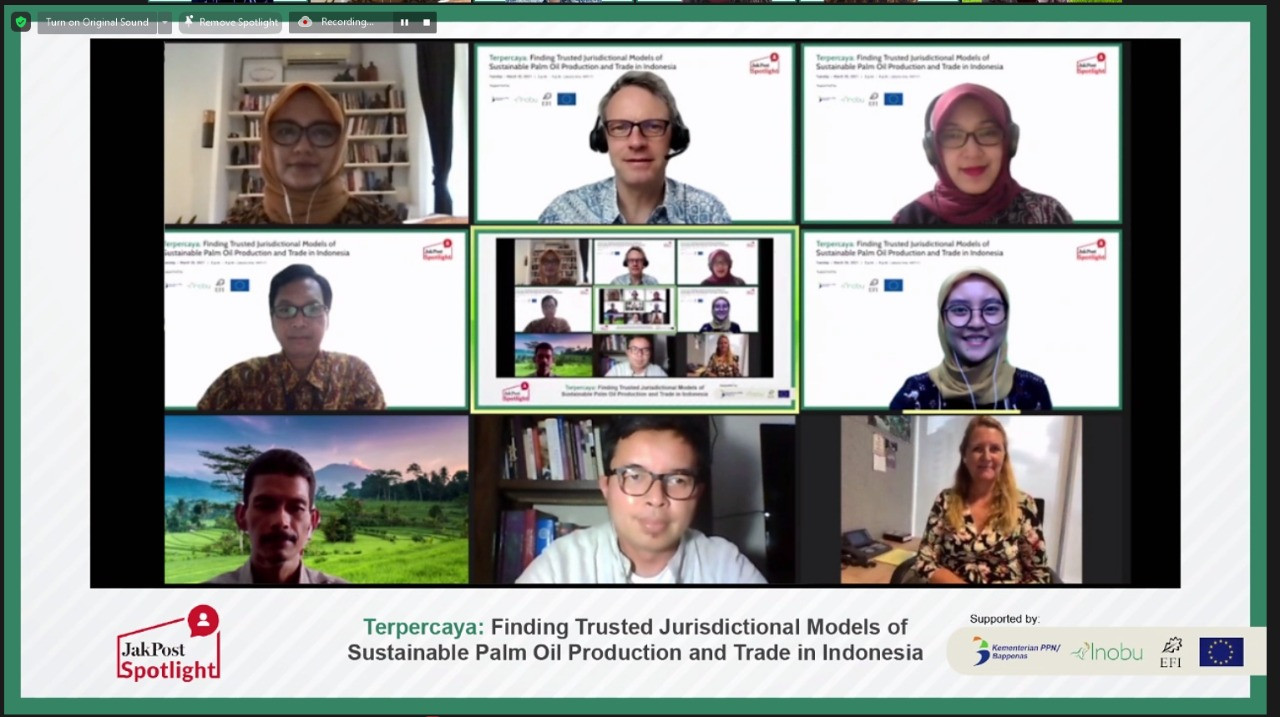Popular Reads
Top Results
Can't find what you're looking for?
View all search resultsPopular Reads
Top Results
Can't find what you're looking for?
View all search resultsSustainable palm: the future of Indonesian palm oil production and trade
Sustainability is perhaps the biggest buzzword in recent years, capturing the zeitgeist of the late 2010s and early 2020s.
Change text size
Gift Premium Articles
to Anyone
S
ustainability is perhaps the biggest buzzword in recent years, capturing the zeitgeist of the late 2010s and early 2020s. From food consumption to travel and leisure, sustainability is increasingly driving public opinion, which in turn influences governments.
Arguably, this shift in attitude has impacted one of Indonesia’s largest exports: palm oil.
Trade relations between Indonesia, the world’s largest palm oil producer, and the European Union were damaged in 2017 when the European Parliament issued a resolution calling for inclusion of EU biofuels sustainability criteria to protect peatlands and land with high biodiversity value, or high carbon stock.
Based on scientific information, the EU Renewable Energy Directive II may be amended by June 2021 so that biofuels associated with expansion into carbon-rich areas such as forests, wetlands and peatland would no longer qualify in meeting EU renewable energy targets. Their consumption would gradually be reduced to zero between 2023 and 2030, but non-biofuel palm oil imports to the EU would not be affected.
In spite of the challenges, palm oil production has benefited millions of farmers across Indonesia, Malaysia and Thailand. Indonesia alone supplies approximately 56 percent of the global crude palm oil (CPO) trade, with an export value of around $21 billion in 2020 that accounted for 12.86 percent of the country’s total exports.
In a webinar held by Inobu and The Jakarta Post, Henriette Faergemann, First Counselor of the EU Delegation to Indonesia and Brunei Darussalam, spoke of the European Green Deal the bloc announced at the end of 2019.
“This is our growth strategy to overcome the challenges of climate change and environmental degradation and to transform the EU into a modern, sustainable, resource-efficient and competitive economy where there are no net emissions of greenhouse gases by 2050, economic growth is decoupled from resource use and no person or place is left behind,” she said.
Faergemann noted that key issues in the Green Deal relevant to palm oil production included renewable energy, which she said was essential in the transition to clean energy and mitigating climate change.
The EU’s deforestation policy is driven by studies that show forest cover around the world is continuing to decrease at an alarming rate, exacerbating global warming, causing biodiversity loss and affecting the livelihoods of some 1.5 billion people.
Faergemann also said 80 percent of global deforestation was driven by agricultural expansion, which was in turn driven by demand for products like soy beans, cattle, palm oil and wood. The EU, she added, consumed one-third of globally traded agricultural products related to deforestation, corresponding to 10 percent of global deforestation associated with the production of goods or services.
Asep Asmara, Director of Export Agriculture and Forestry Products at the Trade Ministry’s Directorate General of Foreign Trade, discussed the importance of the palm oil trade for Indonesia, noting that the sector directly employed some 5.3 million people and provided incomes for 21.2 million farmers and their families.
He also described several barriers to CPO trade with the EU, covering EU and country-driven proposals that could hinder CPO trade along with perceived negative campaigns by the private sector.
The latter included French supermarket Système U’s anti-palm oil campaign in 2012, Dutch airline KLM asking suppliers to avoid using palm oil in their products and Swedish furniture producer IKEA launching a children’s book in 2020 on orangutans that had lost their homes to land clearing for oil palm plantations.
Given these opposing positions, perhaps the middle ground is to ensure that palm oil production is sustainable, transparent and humane. One of the proposed solutions is the Terpercaya Initiative.
Terpercaya, which means “trustworthy” in Indonesian, is an initiative led by the National Development Planning Agency (Bappenas) and supported by the EU, nonprofit research institute Inobu and the European Forest Institute’s EU REDD Facility. The project aims to show that agricultural commodities like palm oil can be produced sustainably and in compliance with the law.
By providing this information to consumers and traders, it is hoped they will purchase products from districts that are performing well. This way, progress will be encouraged while others will have the chance to improve forest and land management.
Josi Khatarina of the Terpercaya secretariat who is also senior advisor at Inobu, said the initiative’s “jurisdictional approach” was designed to respond to market demands.
“This approach is inclusive, and the hope is that it can encourage structural changes. From our helping around 3,500 farmers in the West Kotawaringin and Seruyan regencies in Central Kalimantan in obtaining Indonesia Sustainable Palm Oil (ISPO) and Roundtable on Sustainable Palm Oil (RSPO) certifications, we understand that the initial and recurring cost for certification is expensive for farmers,” she said.
Josi also explained that, compared to a certification-based approach, a jurisdictional approach was simpler, more economical, more transparent and more easily verifiable as well as inclusive, allowing the participation of small-scale farmers.
“It also supports regional governments in creating systemic holistic changes, as it targets the main structure of sustainable agriculture practices,” she said, adding that issues like conflicts and deforestation were addressed in Terpercaya’s indicators.










